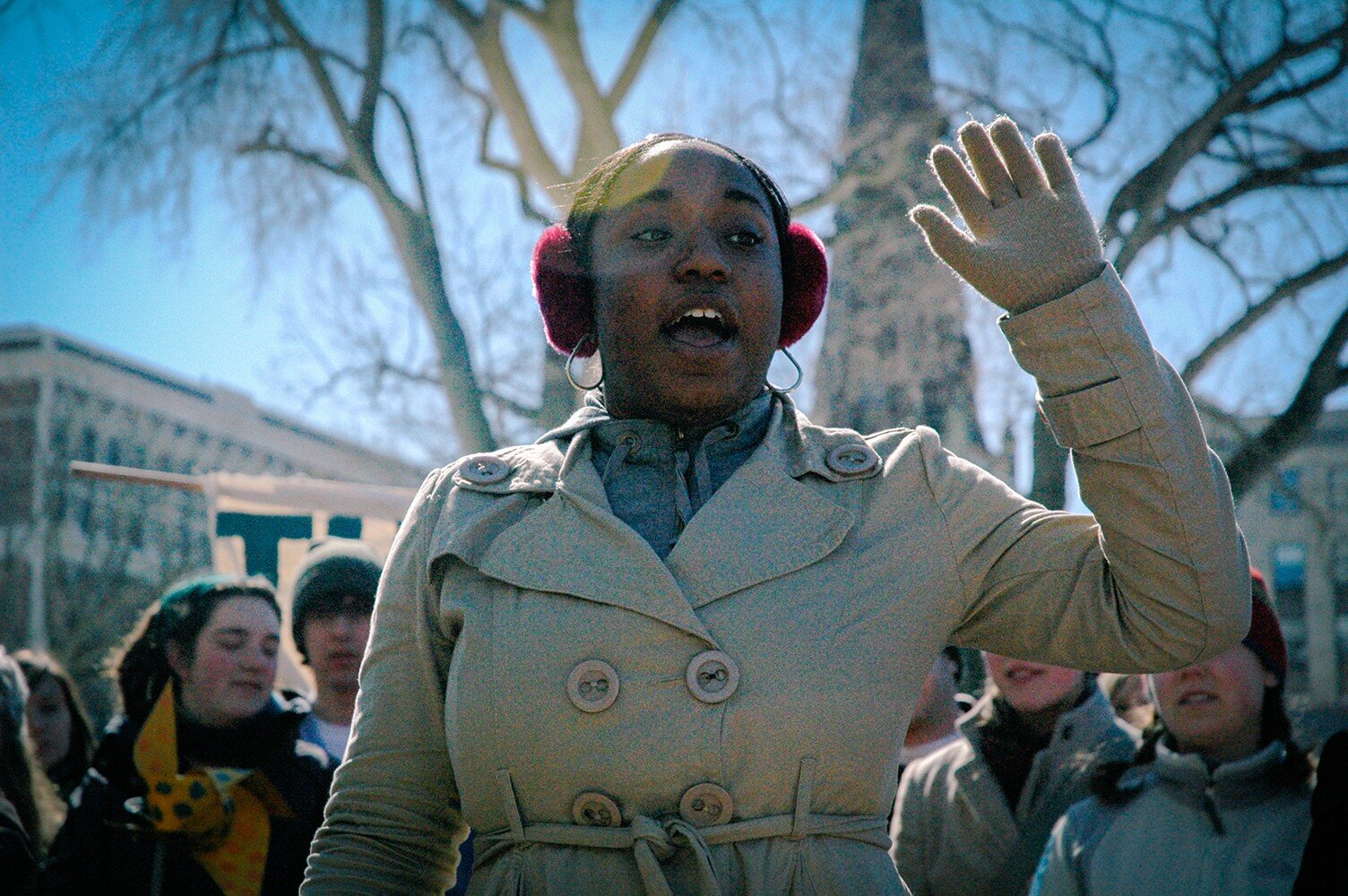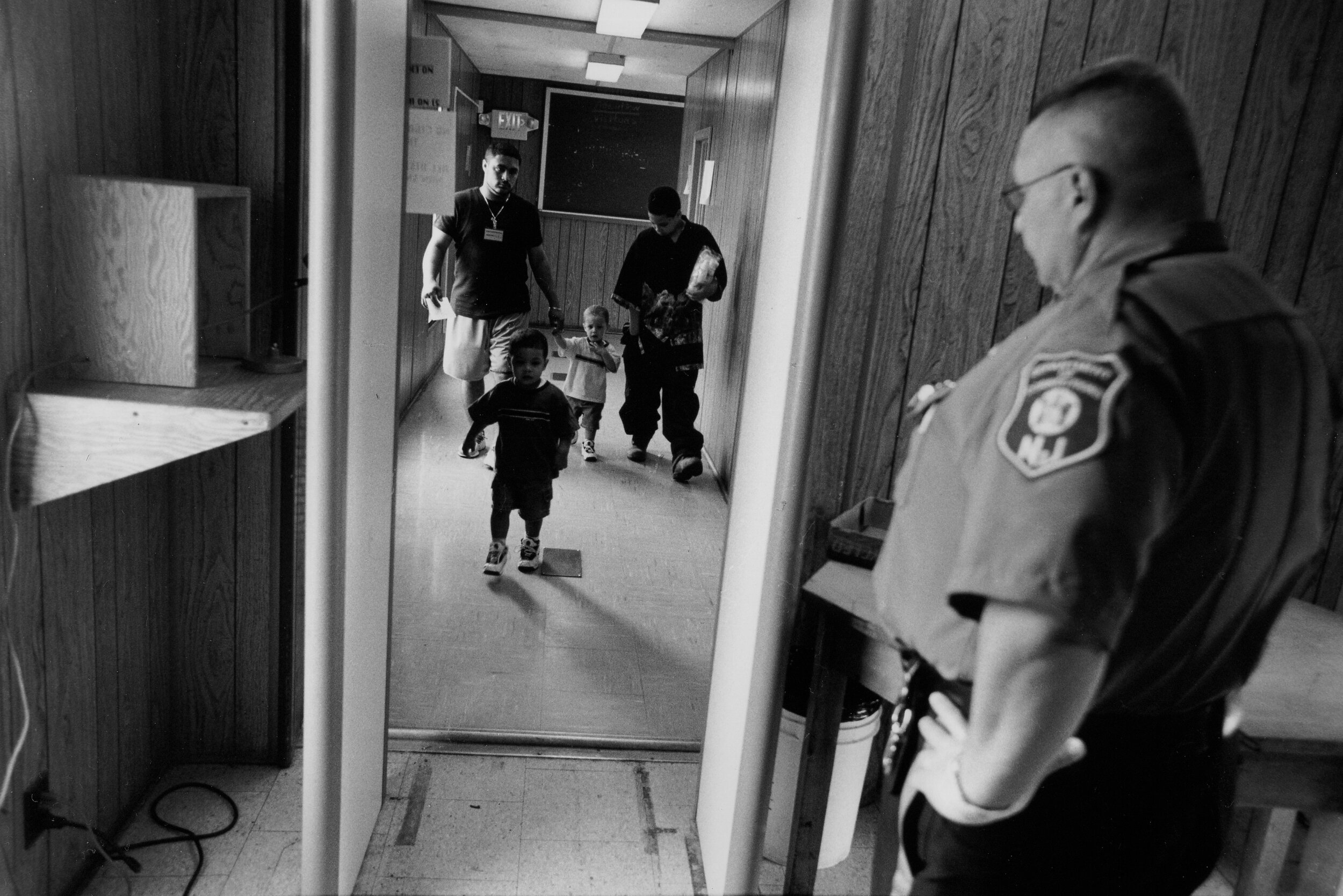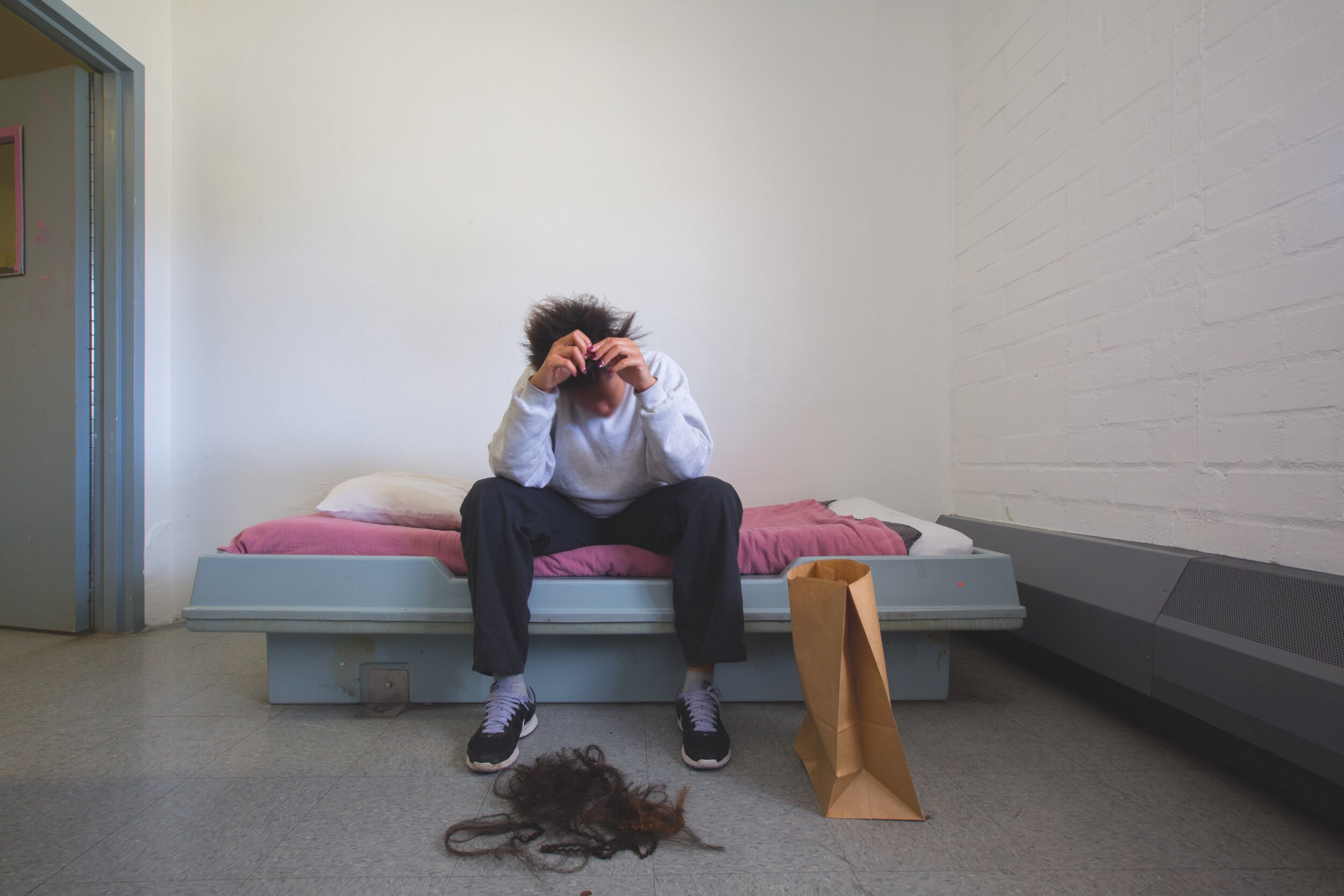Photo: Neil Da Costa for All Rise Mag
TAKING LIFE ON THE INSIDE TO THE OUTSIDE
By Candice Pires
Friends and ex-inmates Marc and Chico discuss how, in spite of the prison system, they supported each other on the long journey from murder convictions to rehabilitation.
On a Sunday morning in fall 2018, in a Portland, Oregon suburb, Marc Trice is standing in the front yard of his townhouse. The 41-year-old kitchen and bathroom contractor shakes my hand and welcomes me into his home. There’s a golf caddy in the hallway and pictures of his wife and family on the walls. Waiting in the living area are his enthusiastic Siberian Husky, Russy, and his best friend and lodger Chico, also 41. Football’s playing on the television and I tell Trice I like the painting on the wall of his dog. “I did it at one of those wine and art evenings,” he says.
Trice and Chico met 14 years ago at Oregon State Penitentiary. Between them they have served 41 years in prison. “Every day is surreal,” he says. “I appreciate every single moment that I’m not sitting in a prison cell.” But these men are an anomaly. As Trice puts it, “The prison system’s not designed for rehabilitation. It’s only designed for incarceration.” Chico adds to his thought, “It really is a miracle that I’m out and able to speak with you. Most people in my situation never get out.”
At 21, Chico was sentenced to 25 years in prison for shooting four people and killing two. “When I was arrested, there was no one that could help me,” says Chico. “It was like my life was over.” He served 19 years and 10 months and was released in July, 2018.
“When I was 12 years old, I remember thinking to myself, ‘I’m going to go to prison,’ and I felt really sad about it.”
Chico describes his childhood in North Portland as being surrounded by drugs, violence and gangs. His father was physically and emotionally abusive towards him and committed suicide when Hernandez was eight years old. “I think anger comes from pain and I was a very angry person,” he says. “I didn’t know any other way. When I was about 12 years old, I remember thinking to myself, ‘I’m going to go to prison,’ and I felt really sad about it.” He came to see violence as a necessary path to survival. “I had very low levels of education; I couldn’t write, I had few resources, and I didn’t have the capacity to look past the situation I was in,” he says.
For all the negativity of his relationship with his father, Chico says he instilled a fighting spirit in him. “He named me Francisco Emiliano after Francisco Villa and Emiliano Zapata, the Mexican revolutionary generals,” he says. “He always told me about them. They were peasants who got tired of people taking advantage of them, and they rose up and fought.”
Marc (right) at MacLaren Youth Correctional Facility in Woodburn, OR.
Trice grew up in rural Eastern Oregon and jokingly calls himself a Black cowboy. The concept of incarceration wasn’t distant from his consciousness either; his older brother and uncle had been to prison and his father to jail. “The first time I got into trouble I was 10 and then I just kept getting into trouble,” he says. “When I look back at myself as a 14-year-old, I see a young, angry teenager trying to figure out who he was.” At the age of 15, Trice was sentenced to 25 to 30 years for murder and assault. He didn’t know how to process it, “I just wanted to give up. But my family helped me navigate it.” He started out in a juvenile prison and went to Oregon State Penitentiary when he was 25.
When the two men met they had both separately started their own journeys to rehabilitation. For Trice, this began with analyzing and realizing the gravity of his crime. “I was seeing the damage I'd done to families and friends and realizing the mistakes that I'd made, and wanted to correct it and make it right.” Chico said he decided to commit to living well and not spend the rest of his life in prison. “I had a lot of pain, a lot of anger but I started learning about Jesus and was able to forgive the people in my life who I felt had harmed me.” Crucially for Chico he also came to a point where he could finally forgive himself.
Their friendship was built on a shared focus on getting out, whatever it took, and supporting each other in doing so. “If there was drama going on in the yard we'd tell each other to stay in the cell,” says Chico. “When there was racial strife going on in there, even though the blacks and Hispanics were fighting, I didn't stop talking to Marc and he didn't stop talking to me. Me and him weren't going to fight.”
“If you want to change, you have to advocate for yourself to get into school.”
They talked about their life after prison. “I always told him we're going to be hanging out, eating together, going fishing, going camping,” says Trice. “We always said, ‘I’m going to take care of you, you take care of me,’” he adds.
Chico says prison was a turning point for him only because he made it so. “The officers in there, the counselors in there, they don’t care if you get out of your bed and eat. They don’t care how you feel. If you want to change, you have to advocate for yourself to get into school.”
Through the support of another friend, Chico started studying. “I didn’t want anything to do with education before. My self-esteem was so low that I had no confidence in myself,” he says. “Finally, in the fall of 2010, I took a class and it completely changed my outlook.” Low levels of education are more common among people who go to prison. A 2017 study by the Program for the International Assessment of Adult Competencies (PIAAC) showed that 30 percent of incarcerated adults had attained less than a high school diploma compared to 14 percent of non-incarcerated adults.
Accessing education in prison is not easy. The same study found that 70 percent of prisoners who were not currently taking an academic class or program said they wanted to. The conditions are also not conducive to success. “Prison’s basically a human warehouse,” says Chico. “You have so many people locked up in such a small space, physically there’s just no room. I was up on a bunk with a guy below me, a small desk, a couple of shelves, a toilet and sink.” The average prison cell has a floor space of six by eight feet. “It’s like living in your bathroom,” says Hernandez, “with another man in there.”
Chico at a car show inside Oregon State Penitentiary.
Research indicates that opening up education to more people in prison could have a positive impact on lowering the U.S.’s prison population. A 2014 RAND Corporation report found that inmates who had participated in correctional education programs had a 43 percent lower chance of recidivating than those who did not.
Both men also fought hard to get into programs that would help them transition out of prison quicker. They took classes on youth mentorship, communication skills, conflict resolution and dealing with stress. “It gave me a better understanding of recognizing when I’m overwhelmed and how to be assertive,” says Chico. “These programs are available,” says Trice, “but they’re not easy to get onto and they’re not forcing anyone to take them.”
“There are only four of us that have ever done that [graduated] in a prison population of 15,000."
In July 2018, Chico got out of prison. His hard work culminated in his graduation from the University of Oregon, with a Bachelor of Science degree in general social science. Trice went to the graduation to support his friend, “We took up a whole line at the graduation ceremony,” he says. Trice also got his associate degree the year prior. To label both men as prison success stories is to ignore the fact that they are very much in a minority. “Yes, I graduated from the University of Oregon,” says Chico. “But there are only four of us that have ever done that in a prison population of 15,000." They’ve bettered their chances in life in spite of the system they’ve left, not because of it.
“Prison doesn’t work,” says Trice, as Chico nods. “Why would you incarcerate somebody if you can’t rehabilitate them? People need counseling, cognitive skills, as much treatment as possible and then the rest is up to them.” Trice has been out for five years now, and is married after meeting his wife on a dating app. “I swiped right and we started talking. After five dates I was like, ‘I’ve got something to tell you. I’ve been locked up for 22 years.’ She started laughing and was like, ‘Oh shit.’ She said she would never have known.” The couple married in 2017.
Chico has only been out of prison for three-and-a-half months. Before he was released, he said he had a lot of anxiety about work and housing. Trice and his wife invited Hernandez to come and live with them as Hernandez’s own family were out of state, and he had to stay within Oregon. “It meant the world to me,” says Hernandez. “I immediately said, ‘Yes.’ It’s been a huge blessing.”
“Life is good and precious…we need to value it and ourselves.”
The first two months went smoothly. Chico moved in with them and got a local job unloading trucks for a department store. “Everything was just fine and I was spending a lot of time with family [Hernandez has two adult sons and most of his family live in Washington state]. But I have started having feelings of being overwhelmed with having to make decisions,” he says. “Like making a doctor’s appointment. I’ve never in my life had to make a doctor’s appointment. I didn’t even know where to start. Who do I even call?”
The friends highly value their self-earned freedom. Before they went to prison, they both loved fishing; Chico in the rivers around north Portland with his friends and older brother, Trice in the countryside. “We’ve been talking about doing it for years,” says Trice. “When we’re out there, we sit back and talk about how we love having the opportunity to enjoy nature.” In their considered responses and the space that they give each other to think, there’s a sense of catharsis in talking to both men. “When I’m out there,” says Hernandez, “it reminds me that life is good and precious, and we need to value it and ourselves.”
Candice Pires is a journalist from London living in Portland. She writes regularly for The Guardian, recently focusing on stories from people who are homeless on the West Coast. She’s also written for the New York Times and Marie Claire. She enjoys sharing stories from people less heard about in the media.






